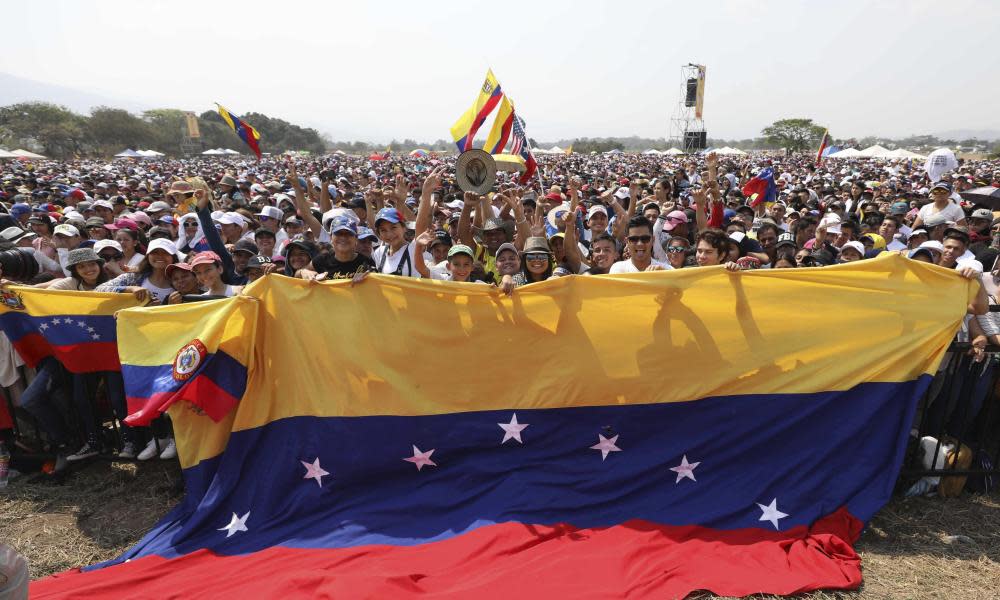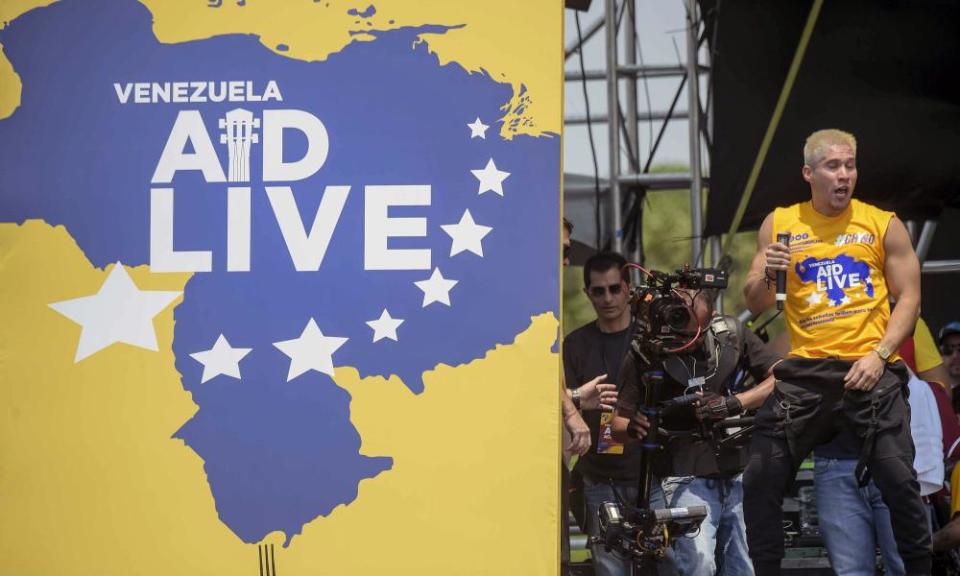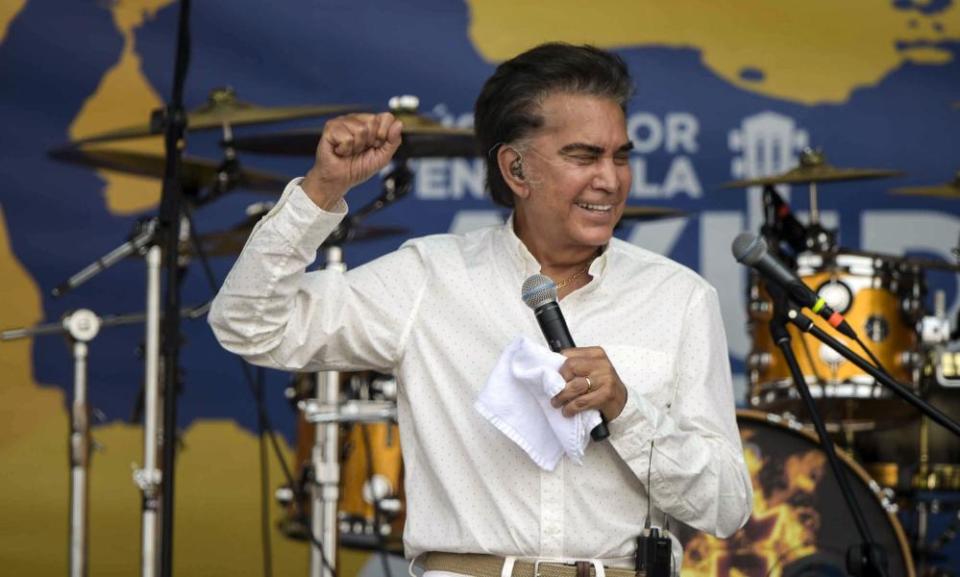US condemns Venezuela military over border killings as aid showdown looms

The US has condemned Venezuela’s military after soldiers shot dead two people and injured 15 others trying to keep the country’s border with Brazil open for aid deliveries.
The White House warned in a statement: “Egregious violation of human rights by [President Nicolás] Maduro and those who are following his orders will not go unpunished.”
The US also urged the armed forces to allow humanitarian aid to pass peacefully into the country, the day before supporters of presidential challenger Juan Guaidó plan to challenge the authority of Caracas by trying to ship food and medical donations into the country.
On Friday evening, Guaidó defied a government travel ban to appear at a star-studded aid concert inside the Colombia border, drawing the biggest cheers of the evening, even after hours of performances from musicians including Maluma, Alejandro Sanz and Luis Fonsi, famous for the global hit Despacito.
He did not take to the stage, perhaps because the concert was billed as a non-political, humanitarian fundraiser, that backers compared to the 1985 Live Aid event.
But the big screens showed him in the crowd, and when the floodlights came up after a final rendition of John Lennon’s hit Imagine the thousands-strong audience began chanting “yes he can” in Spanish.
“I can’t believe he came,” said Nancy Salinas, who had crossed from the Venezuelan city of San Antonio to attend. “He cares about us, unlike the tyrant [President Nicolás] Maduro.”
Guaidó’s appearance was both a surprise and a show of power, because Venezuelan authorities had barred him from leaving the country after he declared himself “interim president” in January, claiming Maduro’s election was voided by fraud.
Amid the rising tensions, US national security adviser John Bolton announced on Friday evening that he had cancelled a planned trip to South Korea to focus on events in Venezuela.
Since Guaidó’s declaration, he has been recognised as the country’s rightful leader by more than 50 countries, including the United States and many regional powers. The presidents of Chile, Colombia and Paraguay all came to the concert on Friday.
On Saturday the opposition will test whether he can transfer a wave of popular support and international recognition into political power, by attempting to bring aid across the border into Venezuela.
“The humanitarian aid won’t solve all of Venezuela’s problems,” said Villka Fernandez, a concert organiser and former political prisoner. “But it signals the end of the regime of Maduro and his criminal cronies.”
Maduro has called the planned deliveries a “provocation”, barred them from entering the country, and claimed relief supplies are coming from Russia instead.
He has blocked the border with Brazil and the maritime border with several islands, as well as ordering military and police units to reinforce crossings with Colombia.
He had responded to the international show of support for Guaido in Colombia by promising a concert of his own on Friday, but it started late and drew a crowd of just a few thousand, many of them bussed in from surrounding towns to watch a show that included uniformed military dancers.
Both concerts was held on the Tienditas bridge connecting Colombia and Venezuela, on a temporary stage in front of containers and an oil truck Venezuelan government forces used to blockade the crossing.
On the Colombian side, a campsite had been set up near the concert site, for volunteers to spend the night before trying to take the aid across.
“Tomorrow is the day we’ve all been waiting for. Tomorrow is the day we can go home,” said Eduardo Espinel, who has lived in Cucuta for three years, and runs a foundation for Venezuelan migrants.
Guaidó, of the Popular Will party, has re-energised an opposition that was fractured and ineffective for years. By promising aid deliveries, he found a powerful way to channel discontent with the government into political action.
Venezuelans face widespread hunger and medicine shortages, and hyper-inflation running at around 2 million percent a year has made salaries virtually worthless. As the country’s economic crisis deepened, more than one in ten have fled abroad.
The security forces have so far largely stood by Maduro, despite opposition efforts to win them over including offers of an amnesty, but their loyalties may be tested if large numbers of civilian volunteers try to import much-needed aid in defiance of the ban.
Video shared by opposition figures heading to the border in a “caravan” from Caracas appeared to show armed national guard members at barricades were barely resisting when crowds pushed them aside so that buses could pass.
In a political boost for the opposition, Chavez’s former spy chief turned against Maduro this week, denouncing him as dictator and calling for aid to pass.
But the security forces are likely to be under strict orders to bar aid regardless of who carries it, and with elite units stationed along the Colombian border, there are worries any showdown could end in bloodshed.

“It’s hard to see a situation this weekend that avoids the military stopping that aid from coming in,” said Rocío San Miguel, a Caracas-based defence analyst. “The military structures towards that border make it impossible that they will let that aid through.”
On the Colombian border, opposition supporters desperate for change said they were undeterred by the threat of violence. “This is a dictatorship that has already taken everything from us, our food, our homes, our medicines,” said Rafael Alfonzo Silva, who had come to assist with logistics, having fled Venezuela two years ago. “They have nothing left to take.”
Despite bellicose threats to the existing regime from American officials, including Donald Trump, Guaidó and his supporters have insisted they do not want a foreign military intervention or violence on the ground.
“We are not talking about an intervention like the ones you see in films, with helicopters and planes landing,” said Dignora Hernández, a legislator from the Vente Venezuela opposition party, who had also travelled to the border.
“we are talking about authorising – according to the constitution – a peaceful mission to allow humanitarian aid to pass.”
Apart from the campsites near the concert site, details of how and where the opposition will try to breach the border are still unclear.
Although much of the media focus has been on the Colombian border, where flows of migrants are high and the two planned concerts have drawn international attention, aid has been stockpiled in several other locations including the border with Brazil and the island of Curaçao. A ship loaded with supplies is also sailing from Puerto Rico.


 Yahoo News
Yahoo News 
